Soon after arriving in South Sudan in November 2020 for my current appointment, I received a WhatsApp message from Fr Abzalón, the Superior General of the Missionaries of the Sacred Heart, wishing me the best with the new mission and saying that he would like to visit one day. In the height of the pandemic, travelling anywhere seemed unlikely, and the possibility of coming to Rumbek would test even the most credulous of believers.
Less than two years later, though, I was in Juba to welcome him early on a Wednesday morning. When I first arrived in 2017 on a research trip, the airport was a simple tent, with no chairs that worked, and a length of runway. Now we have graduated to a building with one carousel, a sort of Central African Knock International Airport if you will. After a brief prayer to St Jude, he successfully negotiated the labyrinthine entry visa process, and we were off.
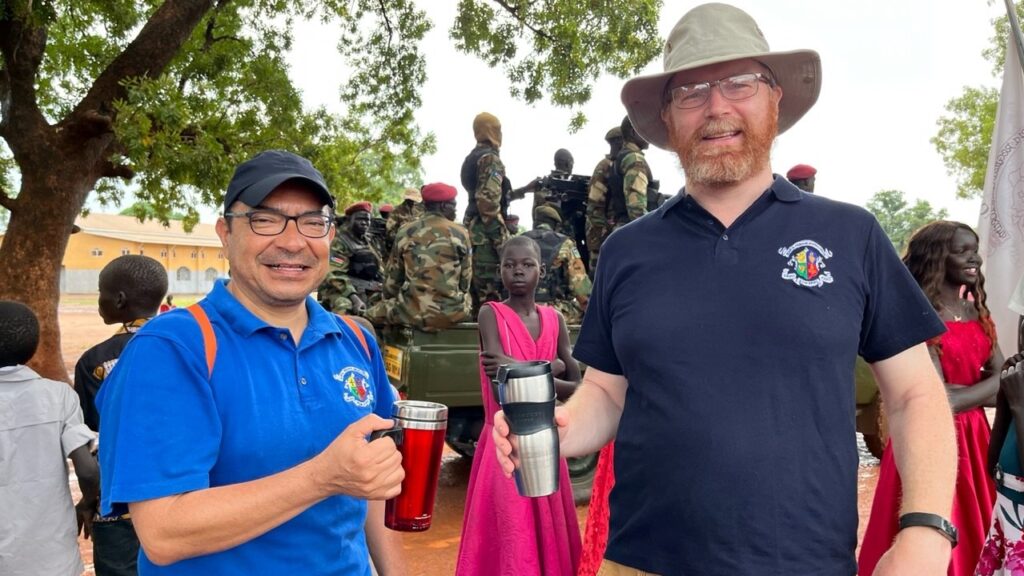
Challenges and resilience
Part of the Superior General’s mission was to see what was happening in Diocese of Rumbek and to explore if there was a need for a greater MSC presence. To that end, we spent our first day meeting with the head of religious missionaries in the country and then the coordinator of the Jesuit Refugee Service (both coincidentally Irish) to get the lay of the land and a sense of the reality of the people. That evening, we had dinner with Christian Carlassare, the newly ordained Bishop of the Diocese of Rumbek. He returned to the country just last March to be ordained, following an attempt on his life in 2021. Over cremated nyama choma (a speciality of grilled meat), the Bishop told him of the many challenges the Diocese faced, but also about the resilience of the people who persevered through a long fight for Independence and the Civil War of 2013.
Before sunrise, we were back to the airport for our flight to Lakes State. The closest approximation to the domestic departures experience is if you imagine the chaos in Dublin Airport earlier this year, then squeeze it all into one-tenth of the space, occasionally switch off the power, raise the temperature about 20C, and then you’re about half-way there. However, our guardian angels were working time and a half, and by 8:10am we had arrived in Rumbek and were heading to Loreto, which would be Fr Abzalón’s base for the week.
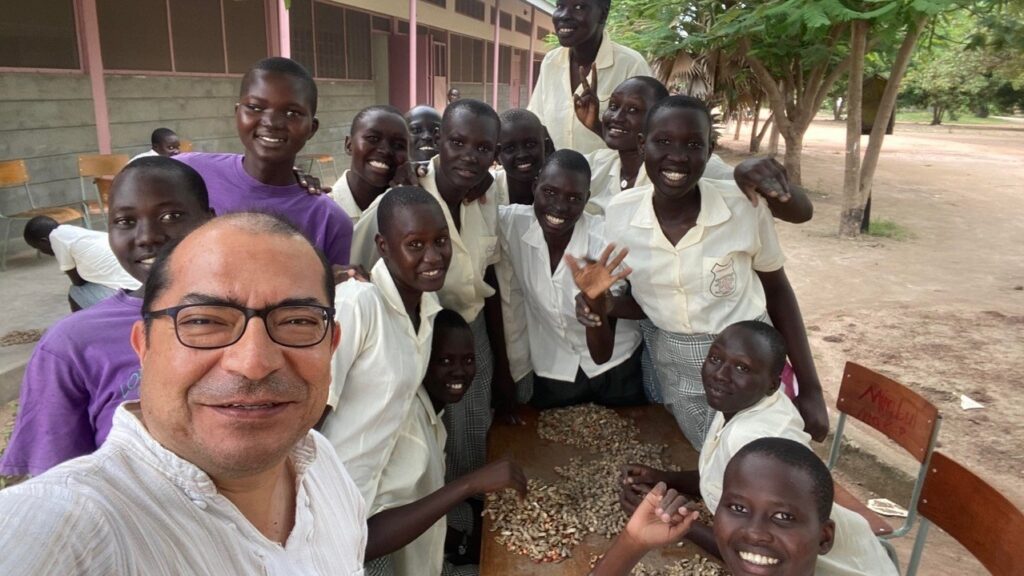
Exploring Loreto and beyond
Fr Abzalón had the opportunity to explore the Loreto compound, beginning with the Mary Ward Primary Health Care Clinic. In addition to looking after all the students and staff, it has responsibility for nine local villages encompassing 27,000 people. Most come for vaccinations, nutritional support, and especially malaria treatment. In the primary school, there are 1,400 day pupils, with a further 340 boarding girls in the secondary school. We are coming to the end of the first semester, so everyone was intent on their revision for exams. That afternoon he came to the Catholic University of South Sudan, Rumbek, where I work as principal. There, he met the young men and women who are training to be the teachers and the business people of the future.
It’s hard to believe in recent years that to drive into the east of Rumbek would mean that you were taking your life in your hands. It would be highway robbery, except there was no highway and if you got away with just being robbed you would be doing well. With the arrival of the new governor last year there have been far fewer problems. On Friday, we joined the final-year students and some of the staff to be part in a peace walk to the Parish of the Good Shepherd in Thonaduiel. We started off like good pilgrims at dawn and arrived eight hours later and 45km away, finishing with a short time of prayer. It was a witness for the villages we walked through of the country that could be built together if peace were to flourish.
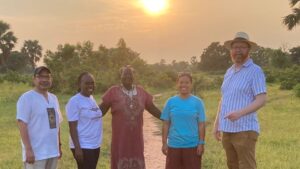
South Sudan celebrated its Independence on the 9th of July 2011, and every year since then it has been a day for processions, speeches, and sports in Freedom Square. They have an understandable sense of pride over the establishment of their nation, but are conscious too of the outstanding issues that remain, most notably peace building, the rights of women, and the first elections that are due to take place next year. The Loreto students were out in force for the day and their marching was featured on national TV, to the great excitement of all the girls.
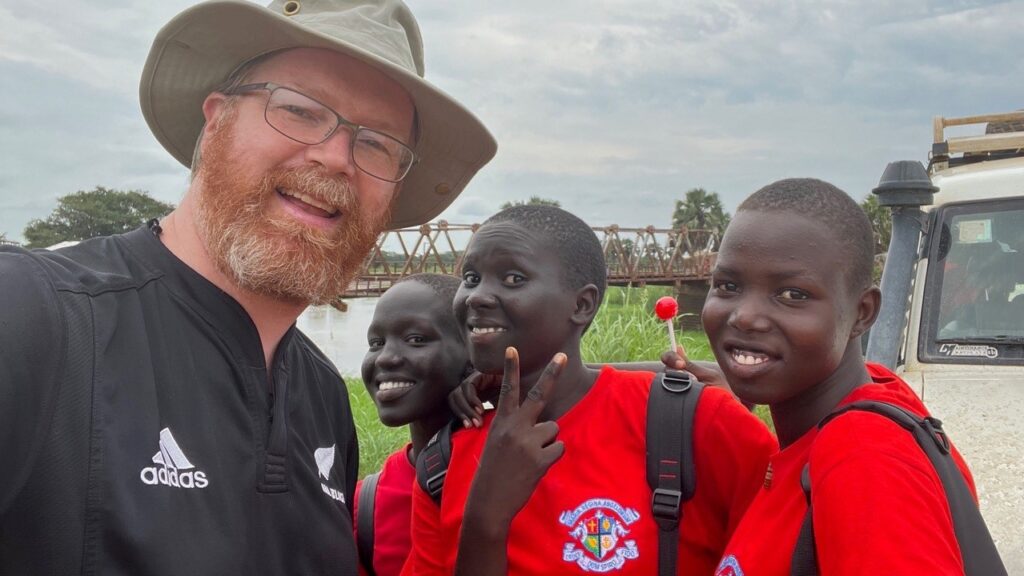
Pioneering work
The next few days allowed Fr Abzalón the chance to visit some of the local villages in Maker Kuei, where we are based. People live in simple conditions with a quiet dignity and have a genuine warmth for visitors. He took a cooking class to learn how to make combo (a type of stew containing vegetables, peanuts, and meat) over a charcoal fire. He also attended some of my CRE classes in the secondary school and shared what life is like in Guatemala, his home country. It was a special blessing to have him celebrate our Sunday Mass for the students outdoors under the shade of the neem trees.
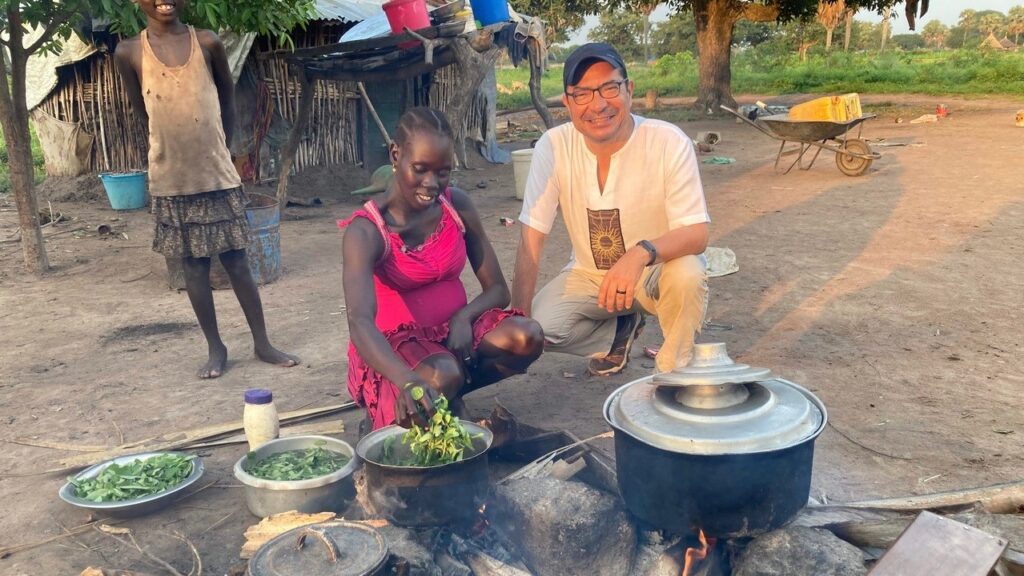
As his week came to a close, Fr Abzalón still had a lot to see. On Tuesday, we went to visit the Daughters of Our Lady of the Sacred Heart in Mapourdit. The Daughters are the trailblazers of the Chevalier Family in South Sudan. They have been here for over twenty-five years and they endured many hardships before the country won Independence. Today, they continue their pioneering work in education and healthcare under the most challenging of conditions.
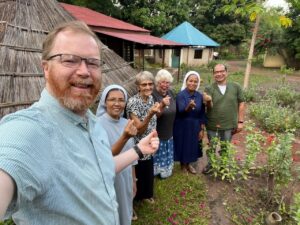
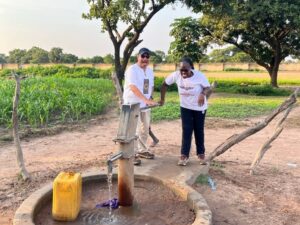
Thursday came around quicker than anticipated and Fr Abzalón headed back to Juba to get a COVID test and an onward flight to Rome. Looking back on his experiences he wrote to us that same week:
“The mission … is a wonderful and prophetic project of education and integral promotion, especially of young women. The community there struggle day by day to build and transform this challenging and complex, but at the same time, beautiful reality. The Chevalier Family is present in South Sudan.”
– Fr Abzalón Alvarado Tovar MSC
Superior General of the Missionaries of the Sacred Heart
Ben Nhialic areer kek a yin,
Fr Alan
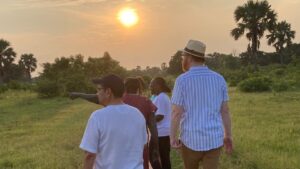
Read more from Fr Alan’s missionary journey in South Sudan:
- Looking for a Sign on the Way to South Sudan
- Building a Better Future in South Sudan
- Christmas Greetings from Fr Alan in South Sudan
- A Cup of Sugar and Maybe a Goat
- Mock Exams and Real Life in South Sudan
- As Easy as Baking a Cake
- Holy Week on the Move
- Three Arrivals and a Party
- Celebrating the Missionary Life
- Seeds of Hope
- Young People Fighting COVID-19 in Rumbek
- Ticket to Ride
- Lions, Snakes, and the World’s Deadliest Predator
- Vaccine Status: Denied
- Christmas in South Sudan
- A Bigger Shovel
- A Week in the Life of Loreto – Bishops, graduations, an ambassador, and the Pope
- Sowing Seeds
PLEASE HELP US TO TRANSFORM LIVES IN SOUTH SUDAN